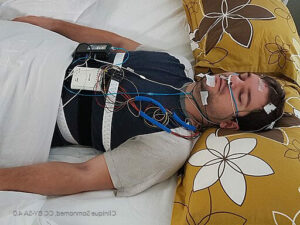We intend to examine multiple sleep studies that have been conducted in the past two years and performed at the MGH Neurology Sleep Medicine Laboratory in well characterized patients with ME/CFS.
Problems with sleep in ME/CFS is essential to understand and effectively treat or prevent crashes. Previous studies, using technologies available at the time, have failed to identify any specific sleep abnormalities in ME/CFS. Over the past decade, improved technologies and understanding of sleep physiology has become available. Furthermore, more specific treatments and approaches have become available for usage in sleep disorders. We propose to use these current state-of-the-art technologies and understandings to revaluate sleep studies that have been conducted in the past two years and performed at the MGH Neurology Sleep Medicine Laboratory in well characterized patients with ME/CFS.
Furthermore, in previously collected brain fluid samples, we will develop techniques to measure orexin, which is an important protein that control sleep boundary states.
Lastly, in a pilot study, we will examine a small ME/CFS patient cohort with our sleep colleagues at the Beth Israel Deaconess Medical Center Clinical Research Center using the most advanced technologies available to better identify and understand any possible abnormalities in high frequency signals in the deep brain function. Prior reports, using older methods that are highly influenced by more superficial EEG signals from the brain cortex, have failed to identify any identifiable similarities to sleep disorders. However, excessive sleep fragmentation is seen. Deeper brain function, particularly as identified looking at higher frequency events, are possible, if not likely, to be identified as dysfunctional in some way in these patients. Based on ME/CFS symptoms and a suggestive prior study that evaluates spectral coherence data, the possibility of sleep disturbance is worth exploring.
